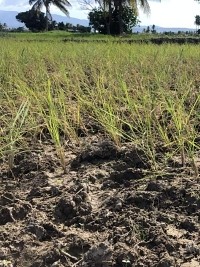|
||||||||||||||||||
|
|
Haiti - Artibonite Valley : Rice production, a disaster in 2022 09/04/2022 11:04:19
"The year 2022 will be a catastrophic year for rice production in the Artibonite," said agronomist Chavannes Jean Baptiste, Founder of the Mouvement Paysan Papaye, the largest farmers' association in Haiti. He explains that the fields have become very vulnerable to droughts, as over the past 10 years the irrigation systems have been damaged and not maintained, due in recent years to armed gangs operating in the area. These gangs not only prevented the farmers from producing, but they also interrupted and damaged the irrigation system, for which no type of rehabilitation was carried out." Chavannes Jean Baptiste, recalls "[...] Haiti was self-sufficient in rice until the 1970s, but production gradually declined, due to rice imports authorized in 1986, after the fall of the dictatorship of Jean-Claude Duvalier." "[...] The other destructive moment for local rice was the lowering of tariffs decreed in 1995, after the return to the country of Jean Bertrand Aristide [...] Haiti has become the country with the lowest rice tariffs in the Caribbean." Cheap rice from the United States has helped change consumption habits in Haiti, since it has replaced other foods that were more consumed such as corn, bananas, potatoes or cassava to the point that today Haitians say they have not eaten if there is no rice on their plate... Figures support this perception, rice consumption has quintupled since 1985, from 100,000 to 500,000 tons per year, while production in Haiti has never exceeded 100,000 tons and is now in decline, according to a study by the Department of United States Agriculture (USDA). At the same time, the growth in imports has dealt a fatal blow to local rice farmers, who complain that they are not competitive on equal terms because they do not receive state subsidies and production is not mechanized. About 90% of rice imports come from the United States and Haiti is its second largest rice market. "We can't compete with American rice because we don't have the means to do it and it's done by hand," laments a farmer from Gonaïves. "Meanwhile, in Haiti, production costs have increased in Haiti, in particular because of the rise in fertilizer prices, without the State helping the peasants," deplores Jean Baptiste. SL/ HaitiLibre
|
|
|
Why HaitiLibre ? |
Contact us |
Français
Copyright © 2010 - 2024 Haitilibre.com |



